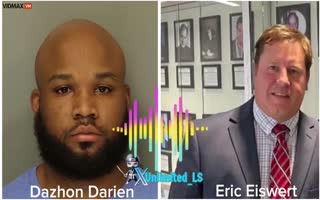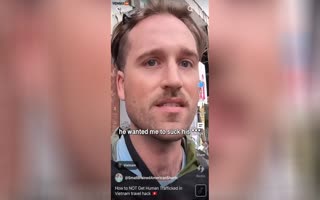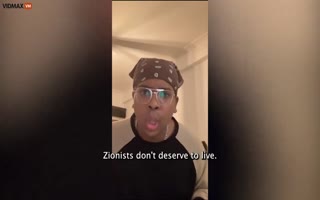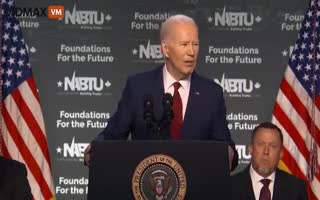 00:42
Communist Professor At Emeroy At Pro-Hamas Rally Learns She Has No Special Privileges With The Cops
00:42
Communist Professor At Emeroy At Pro-Hamas Rally Learns She Has No Special Privileges With The Cops
Elon Musk Says Google Co-Founder, Larry Page Wants To Become A Digital God
 00:46
High School Athletics Director Arrested After Making An AI-Generated Deepfake Racist Rant By The Principle As An Act Of Revenge
00:46
High School Athletics Director Arrested After Making An AI-Generated Deepfake Racist Rant By The Principle As An Act Of Revenge
 01:02
Nashville Passes Legislation Criminalizing Parents Who Help Transition Their Minor Children
01:02
Nashville Passes Legislation Criminalizing Parents Who Help Transition Their Minor Children
 00:57
Dude Almost Gets Sex Trafficked In Vietnam
00:57
Dude Almost Gets Sex Trafficked In Vietnam
 01:28
Columbia University Student Calls For The Death Of 'White Supremacists And Zionists'
01:28
Columbia University Student Calls For The Death Of 'White Supremacists And Zionists'
 00:13
Wheelies Gone Bad Can Be A Real Pain In The Ass
00:13
Wheelies Gone Bad Can Be A Real Pain In The Ass
 00:42
Communist Professor At Emeroy At Pro-Hamas Rally Learns She Has No Special Privileges With The Cops
00:42
Communist Professor At Emeroy At Pro-Hamas Rally Learns She Has No Special Privileges With The Cops
Tesla CEO said Elon Musk said in an interview with FOX News host Tucker Carlson that Google co-founder wants to monopolize the market on AI technology to make himself a "digital god."
CARLSON: Do you think that's real? It is conceivable that AI could take control and reach a point where you couldn't turn it off and it would be making decisions for people?
MUSK: Yeah. Absolutely.
CARLSON: Absolutely?
MUSK: No, that's definitely the way things are headed, for sure.
I mean, things likes say, Chat GPT which is based on GP4 from Open AI which is a company I played a critical role in creating, unfortunately --
CARLSON: Back when it was a non-profit.
MUSK: Yes. Um, I mean, the reason Open AI exists at all is that [Google co-founder] Larry Page and I used to be close friends and I would stay at his house in Palo Alto and I would talk to him late in the night about AI safety. At least my perception was that Larry was not taking AI safety seriously enough. And --
CARLSON: What did he say about it?
MUSK: He really seemed to be -- wanted sort of digital superintelligence, basically a digital god, if you will, as soon as possible.
CARLSON: Hey wanted that?
MUSK: Yes. He's made many public statements ever the years, the whole goal of Google is what's called AGI, artificial general intelligence, or artificial superintelligence. I agree there's great potential for good, but there's also potential for bad. If you've got some radical new technology you want to try to take a set of actions, maximize the probability it will do good, minimize probably it will do bad things.
CARLSON: Yes.
MUSK: It can't just be barreling forwarding and you know, hope for the best. And then at one point, I said what about, you know, we gonna make sure humanity's okay here. [Laughter]
And, um, and then he called me a specist.
CARLSON: Did he use that term?
MUSK: Yes. And there were witnesses. I wasn't the only one there when he called me a specist. And so, I was like okay, that's it. Yes, I'm a specist, okay. You got me. What are you? Yeah, I'm fully a specist. Busted.
So that was his last straw. At the time Google had acquired DeepMind so Google and DeepMind together had about three-quarters of all the AI talent in the world. They obviously had a lot of money and more computers than anyone else. We're in a uni-polar world here where there's one company that has close to a monopoly on AI talent and computers, like scaled computing, and the person who's in charge doesn't seem to care about safety. This is not good. So, then I thought what's the furthest thing from Google would be like a non-profit that is fully open. Because Google was closed and for-profit. So that's why the 'open' in Open AI refers to open source. You know, transparency so people know what's going on.
CARLSON: Yes.
MUSK: We don't want to have -- I'm normally in favor of for-profit. We don't want this to be sort of a profit-maximizing demon from hell that just never stops.
[LAUGHTER]
CARLSON: You want specist incentives here.
MUSK: Yes. We want pro-human to spite the future for humans. Because we're humans.
CARLSON: Just for people who haven't thought this through and aren't familiar with it, and the cool parts of artificial intelligence are so obvious, write your college paper for you, write a limerick about yourself. There's a lot there that is fun and useful. But can you be more precise about what's potentially dangerous and scary? Like, what could it do? What specifically are you worried about?
MUSK: It goes without saying, the pen is mightier than the sword. So, if you have a super-intelligent AI that is capable of writing incredibly well and in a way that is very influential, you know, convincing, and is constantly figuring out what is more convincing to people over time. And then enter social media, for example, Twitter, but also Facebook and others, you know, and potentially manipulates public opinion in a way that is very bad, um, how would we even know?




